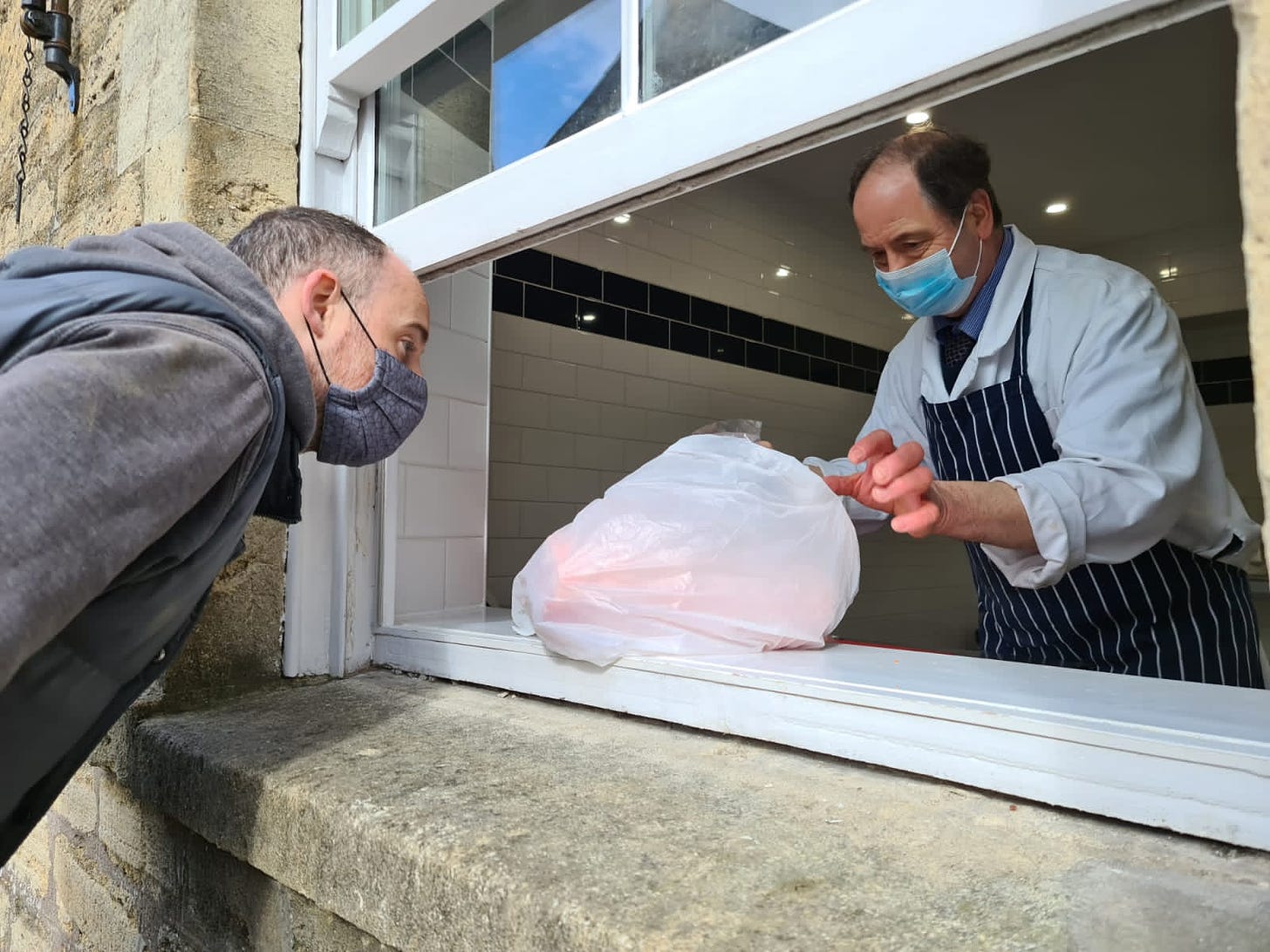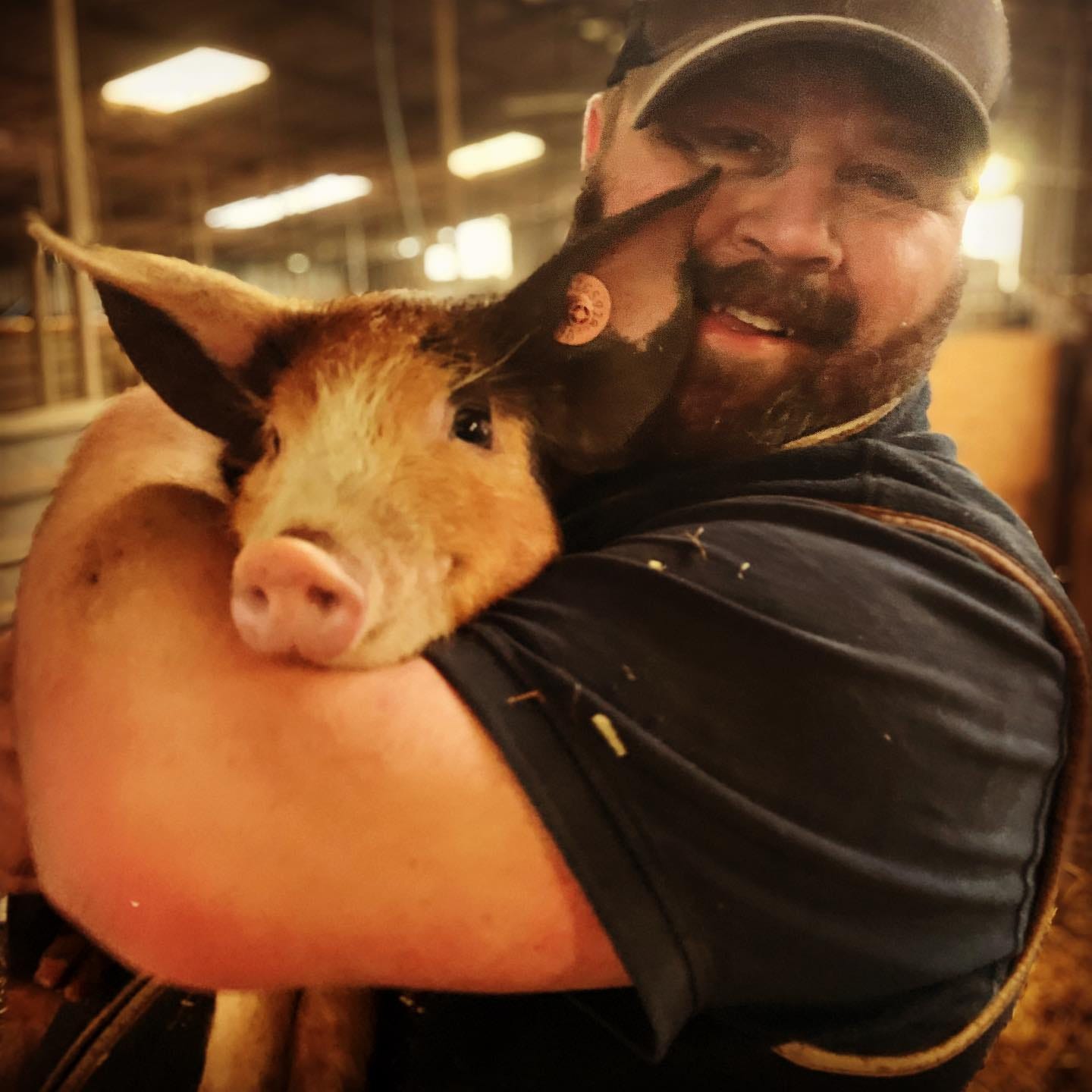In 1990, there were 15,000 butcher’s shops across the UK. If the last count in 2019 still stands true, there are now fewer than 5,500.
Rampant demand for cheap – but unsustainable – meat has not worked in the highstreet butcher’s favour. Recessions, foreign trade deals, and the current rising costs of living have not helped much either.
The pandemic – when people had more time to cook from scratch and go out for their weekly shop – instigated a resurgence among local businesses. Spending on meat in British butchers rose by almost a third during lockdown, as butchers were regailed as ‘heroes’.
But, while anxieties surrounding the pandemic subside, those habits are curtailing, and shoppers are being lured elsewhere. One butcher local to Frome recently told me his business has dropped to “appalling” levels.
Perhaps this is just Darwinism in motion, or the way the free market works. If other options allow for meat that’s cheaper and more convenient to everyone, why should we bother visiting a butcher ever again?
It sounds counterintuitive, but a good high street butcher wants you to buy less meat. Overall meat consumption is at the point of excess, and as such large proportions of it are farmed in irresponsible ways, it’s driving the planet ever closer to disaster.1
“If you’re eating local meat from traditional mixed farming, without the industrialisation, that isn’t the issue,” says Owen Singer, who owns Penleigh butchers on Stony Street. “If you are coming to a local butcher, chances are their meat isn’t not going to be mass-produced – the carbon footprint is gonna be a lot less.”
Butchers also appreciate that, in Adrian Cayford’s own words, “meat is expensive.” Adrian’s family has had the butcher’s shop on Catherine Street for 60 years. “When I started 30 years ago, people would eat it everyday. And then we got customers who’re not going to shop at the supermarket. They’re wanting to eat meat twice a week, and they’re going to eat better quality. And that’s where myself, Owen [Penleigh], and Nigel [H.E. Williams & Sons] get a score over the supermarket.”

Meat, for what it’s worth
Supermarkets will win some battles for your wallet (whole chicken and steak cuts can come out half the cost, or even less, of what you’d spend in a butcher). But not all of them – chicken wings go for almost nothing in a butcher’s shop, thighs are cheap, and while the best sausages on a supermarket shelf will cost a few quid less, a fiver for eight sausages might not seem too steep when they’re made by the man who sold them to you, and from his own pigs (as is the case with Penleigh).
Going for so-called ‘lesser’ cuts is also a good way to shave costs off the food bill. These cuts are typically from parts of the animal that, while they’ve seen more exercise and thus take longer to cook, arguably yield more flavour than premium cuts like sirloin, chops, or T-bone. “Beef skirt for frying steaks used to be the cheapest,” says Owen. “But chuck [£11.59/kg], slow roasting joints [£17/kg], and brisket [£10/kg] are relatively cheap. Even more so in the summer.”
As for lamb, breast (£9/kg) and neck are the cheapest parts of the animal, though the cost of lamb is currently at heights many working in the industry have never seen. “If you generally want cheaper meat, go for chicken or pork,” says Owen.
Though some prices can be high, butchers aren’t making a huge profit here – in most cases it’s about establishing a fairer price for the farmer, processors, themselves, and of course the customer. This means accommodating where accommodating is needed. “It’s all right if you’ve got the price per kilo labelled on your ribeye,” says Owen, “but if you don’t know how big your ribeye is going to be, it can be a bit of a shock when it hits the scales. If you haven’t got a lot of money in your pocket, I can see that as intimidating.
“The thing is, if someone asks for something and I know it’s going to end up expensive, I’ll tell them. If someone says it’s a bit too much for them, I’ll say we can cut it smaller, or we can move from ribeye to sirloin or rump. Someone might come in and point to a leg of pork and say, ‘but I don’t want all of that.’ and I’ll say, “It’s alright, I’ve got a knife. This is what a butcher’s shop does.’”

(Not) going the extra miles
No one behind a butcher’s counter at the supermarket is able to tell you where their lamb was grazed, or the name of the farmer who produces their beef. If you want local meat, one of the few ways to get it is through a local high street butcher.
“It’s a priority for us,” says Adrian. “We like that we can tell a customer exactly where it comes from. Our chicken’s from Castlemead – he’s the most local at Radstock. Our lambs come from John Gould at Withywood Farm in Cranmore. Our beef is from Howard and Sons at Manor Farm near Devizes. Our pigs come from a guy called Chris Hill at Wessex Pork. He’s our furthest away – he comes from the other side of Taunton. His abattoir is only three or four miles from his farm.”
That’s nothing considering the supply chains supermarkets use, where animals are often lorried up the country, then slaughtered, for their carcasses to be transported all the way back again.2 This impacts the welfare of livestock, where the longer the journey they have to take in a packed lorry or trailer, the more stress they’re likely to experience. This is why more smaller, local, abattoirs (which are dying out at a faster rate than butchers) are essential to obtaining local meat, and in supporting other local businesses – such as farms and butchers – that use them.
“The whole local thing is massive for me,” says Owen, who raises his pigs on his farm near Westbury. “We use Stiles at Bromham, and Stillmans at Taunton. The reason we use Stillmans is because the quality’s always very good, and the delivery times. The food miles may have crept up a little bit for us recently, but it’s still ridiculously low. It’s still all Somerset.”
As for Nigel at H.E. Williams & Sons, he mostly uses Creedy Carver just outside Exeter, and Stillmans and Prestige Pork in the Taunton area.

Popular restaurants a butcher makes
Do you dream of The Griffin’s fried chicken? Burrito Boi’s signature dish? Or maybe Hamper’s salt beef bagel? All that meat comes through Penleigh, and is virtually the same as what you’d buy from the Stony Street shop.
Penleigh is a rare example in that, when talking about farming pigs, they control every part of the process except the slaughter. This can have a markedly different effect on the final product, especially on taste. “When we went into keeping pigs, we started processing them ourselves and trying our own products,” says Owen. “As soon as I tasted it, I knew instantaneously it was better.
“Differences in flavour become really really really evident in pork. Because mainstream pork is whatever hybrid breed comes through. Whereas if you went breed specific – say, Middlewhite, Tamworth, or Gloucester Old Spot – they have a higher fat content, the meat is darker, and has more flavour. Any rare breed of pig like that has been bred for flavour over hundreds of years. Where, usually, it’s not about flavour – it’s about how quickly can you make it grow, or how little can you feed it.griffinfromeA post shared by The Griffin Frome Craft Pub (@griffinfrome)
“It’s the same with cattle – we found that meat from Hereford and Angus beef, from heifers [a cow that hasn’t calved] rather than steers or bulls, produce a nice marbling. These breeds don’t make you enough money because they don’t grow fast enough. But a lot of our customers have come to the conclusion that when the fat emulsifies, the flavour is incredible.”
Adrian, meanwhile, wants customers to be more inquisitive about quality and provenance. “Where we’re different from other butchers is we buy direct from farmers, so we know exactly what’s coming in. If you really wanted to go to town, we could tell you what breed of animal it was. But no one really asks.”
Where they’re often similar is in chicken – like Cayford, Penleigh sources from Castlemead, who rear their hens outdoors, foraging on insects and seeds in supplement to their feed. It means you end up spending the best part of £10 on a whole bird, but few other producers can compete on flavour and welfare, as only about 5% of chicken is produced this way.
You could say Nigel goes one further. He gets his poultry from Creedy Carver, which is another farm that allows its hens to roam the outdoors, and a name proudly written into high-ranking restaurant menus. The likes of Angela Hartnett and Tom Kerridge swear by it.
In the words of YouTubers around the world, don’t forget to likecommentandsubscribe!!
Know your chicken
In an ideal world, where even trust cannot be understated, we’d all personally know the farmers we buy meat from. The closest many of us can get to that is with a butcher – especially one like Owen, who raises his own pigs. Failing that, it’s a matter of finding the butcher whose values you most closely align with: be it price, quality, traceability, or welfare.
If you were to ask me, go to Cayford when you want to know the name of the farmer who supplied your beef. Go to Penleigh for pork and other piggy bits, like their sausage rolls and award-winning black pudding. And go to Nigel’s for Creedy Carver chicken and bones – which he collects until the end of the week – for stock.3 4
Just don’t queue up at Sainsbury’s meat counter expecting the same kind of service.
Further reading
What does buying local food do for the economy? [WFJ #5]
A butcher’s guide to beef cuts
The meat of the matter: Britain’s small abatoirs – ergo sustainable meat – are in peril1
This is purposely underelabourated, as the topic of livestock emissions requires a lot of explanation. Explanation that, at some point, will be incluided in a later issue of the WFJ…2
Admittedly, at the moment this is somewhat speculative, as there is no public record of where livestock is picked up and where it is slaughtered, but it does fit in with the scattered nature in which the supermarket supply chain is interconnected.3
If you ask for chicken bones or carcass, and if they have them available, butchers will usually give you them for free (especially if you’re visiting not to simply freeload, and want to buy at least one other item). 4
Any other ‘hacks’? Please let the rest of us know in the comments.
68 Comments
Madelinet
The offer is still valid. Details https://zetds.seychellesyoga.com/jml
Laurat
Content for your website https://zetds.seychellesyoga.com/info
Karent
Web Development Wizards https://zetds.seychellesyoga.com/info
Evelynt
Can provide a link mass to your website https://zetds.seychellesyoga.com/info
Angelinat
Your site’s position in the search results https://zetds.seychellesyoga.com/info
Jennyt
Your site’s position in the search results https://zetds.seychellesyoga.com/info
Sarat
Free analysis of your website https://zetds.seychellesyoga.com/info
Gracet
Content for your website https://zetds.seychellesyoga.com/info
Melissat
Web Development Wizards https://zetds.seychellesyoga.com/info
Naomit
Can provide a link mass to your website https://zetds.seychellesyoga.com/info
Chloet
Your site’s position in the search results https://zetds.seychellesyoga.com/info
Maryt
Free analysis of your website https://zetds.seychellesyoga.com/info
Editht
SEO Optimizers Team https://zetds.seychellesyoga.com/info
Wendyt
I offer mutually beneficial cooperation https://zetds.seychellesyoga.com/info
Shirleyt
Cool website. There is a suggestion https://zetds.seychellesyoga.com/info
Stacyt
I really liked your site. Do you mind https://zetds.seychellesyoga.com/info
Isabellat
Here’s what I can offer for the near future https://zetds.seychellesyoga.com/info
Estert
You will definitely like it https://zetds.seychellesyoga.com/info
Patriciat
Content for your website https://ztd.bardou.online/adm
Priscillat
Web Development Wizards https://ztd.bardou.online/adm
Katherinet
Can provide a link mass to your website https://ztd.bardou.online/adm
Judyt
Your site’s position in the search results https://ztd.bardou.online/adm
Monat
Free analysis of your website https://ztd.bardou.online/adm
Constancet
SEO Optimizers Team https://ztd.bardou.online/adm
Tinat
I offer mutually beneficial cooperation https://ztd.bardou.online/adm
Susant
Cool website. There is a suggestion https://ztd.bardou.online/adm
Irist
I really liked your site. Do you mind https://ztd.bardou.online/adm
Jessiet
Here’s what I can offer for the near future https://ztd.bardou.online/adm
Lindat
Content for your website https://ztd.bardou.online/adm
Rutht
Web Development Wizards https://ztd.bardou.online/adm
Gwent
Can provide a link mass to your website https://ztd.bardou.online/adm
Pollyt
Your site’s position in the search results https://ztd.bardou.online/adm
Evat
Free analysis of your website https://ztd.bardou.online/adm
Sandyt
SEO Optimizers Team https://ztd.bardou.online/adm
Elizabetht
I offer mutually beneficial cooperation https://ztd.bardou.online/adm
Melissat
Cool website. There is a suggestion https://ztd.bardou.online/adm
Margarett
Content for your website http://myngirls.online/
Zoet
Web Development Wizards http://myngirls.online/
Janicet
Can provide a link mass to your website http://myngirls.online/
Roset
Your site’s position in the search results http://myngirls.online/
Constancet
Free analysis of your website http://myngirls.online/
Mandyt
SEO Optimizers Team http://myngirls.online/
Wendyt
I offer mutually beneficial cooperation http://myngirls.online/
Margarett
Content for your website http://fertus.shop/info/
Zoet
Web Development Wizards http://fertus.shop/info/
Janicet
Can provide a link mass to your website http://fertus.shop/info/
Roset
Your site’s position in the search results http://fertus.shop/info/
Constancet
Free analysis of your website http://fertus.shop/info/
Mandyt
SEO Optimizers Team http://fertus.shop/info/
Wendyt
I offer mutually beneficial cooperation http://fertus.shop/info/
Janet
Cool website. There is a suggestion http://fertus.shop/info/
Rebeccat
I really liked your site. Do you mind http://fertus.shop/info/
Chloet
Here’s what I can offer for the near future http://fertus.shop/info/
Madisont
You will definitely like it http://fertus.shop/info/
Violat
The best prices from the best providers http://fertus.shop/info/
Jacquelinet
Additional earnings on your website http://fertus.shop/info/
Priscillat
Analytics of your website http://fertus.shop/info/
Charlotet
I would like to post an article http://fertus.shop/info/
Lydiat
How to contact the administrator on this issue http://fertus.shop/info/
Veronicat
Shall we exchange links? My website http://fertus.shop/info/
Irmat
The offer is still valid. Details http://fertus.shop/info/
Pennyt
We offer cooperation on SEO optimization http://fertus.shop/info/
Cassandrat
Content for your website http://fertus.shop/info/
Louiset
Web Development Wizards http://fertus.shop/info/
Valeryt
Can provide a link mass to your website http://fertus.shop/info/
Zoet
Web Development Wizards http://fertus.shop/info/
Roset
Your site’s position in the search results http://fertus.shop/info/
Mandyt
SEO Optimizers Team http://fertus.shop/info/